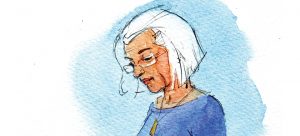
The Evolving Species
And bound to the South, for good reason
By Elizabeth Edmonds
Once in a while I start to think about what it would be like to live somewhere other than the South. After all, we have crazy weather, ice today, spring tomorrow, and we have mosquitoes whose purpose and virtue I have yet to understand. But then something will happen and remind me of one of the reasons I continue to make my home here. One of those things happened last week and although a small thing on the worldwide grid it still gives me pause, and I remember why I put up with the unpredictable weather and mosquitoes.
A person passed away in my hometown which now has two stoplights instead of one and three if you count the one on the edge of the city limits. She was 96 and had lived alone for more than forty years. She was a beauty in her day, petite and stylish, and had lots of “beaus” as my 102-year-old aunt said. Tragically, her sister, younger by one year, had passed away at age 21, in childbirth and was buried with her baby in the church cemetery next door to where the two sisters and their parents had lived. She never got over the death of her sister and turned her back on any hope of marrying and having children, choosing instead to stay home and care for her parents until they passed. She would occasionally leave the house for groceries or a doctor’s appointment but gradually retreated into her house, never hosting visitors, never letting anyone in, and spent her days feeding the many stray cats in the neighborhood and the birds.
Slowly the house began to crumble around her. Family and friends urged her to leave, even offering to take her in or set her up in a safer place. She refused to leave saying she wanted to stay in her house next to the church cemetery where her sister and baby were “sleeping.” Her contact with the outside world was by telephone or at the back porch steps. Only one person gained her trust enough to allow him to come in and try to make the necessary repairs around her just to keep her warm and safe. We all wondered why she would put her trust in a stranger and not turn to family for help, but I some things never elude an explanation.
When she did not answer her morning call from her 102-year-old “double first cousin,” the plan was put into place for someone to find the hidden key to her crumbling house and go inside. There she was, on the floor of the room where she spent most of her time. Within three days she passed after suffering a massive stroke.
The little town where I grew up has changed dramatically over the years, not so much in how it looks, but in the demographics. More and more people have passed on and new people have moved to town choosing to live the small town lifestyle while working in the big cities of Greensboro or High Point, so not many people recognized her name. Even the church her whole family once attended now has a praise band and a jumbo screen to scroll the words to songs she would never have recognized.
The little funeral home that has served the town for several generations since it was founded in 1857 handled the preparations for her final journey, the only time she had been out of the house in many, many years. The small group gathered in the funeral home chapel for the service because as she had said in her final hand-written note, “I don’t want a fuss when I die.” The minister spoke as if she had known her for years even though all of their visits had been at the back porch steps. The minister, however, knew things even some of the family did not know. For instance, she had lived on a monthly income equivalent to how much some of us spend just on groceries or on a car payment. And yet, she had never failed to send her tithes to the church in eighty-three years. We didn’t know that she sometimes would opt to feed the cats and birds instead of herself. Oh, it wasn’t for lack of trying to help her that we didn’t know, it was just that she was that private and gave not a hint of her financial situation as she continued to enclose her little $5 bills, sometimes $10 in our Christmas and birthday cards.
She was still so tiny, barely 5 feet tall, that it took only four pallbearers to carry the casket to the hearse. As the hearse pulled out of the parking lot with the small procession following it to the same cemetery where her parents and her beloved sister were buried, I suddenly thought, “Yes, this is one of the reasons I still love the South in spite of its warts and all.”
As the hearse slowly made its way past the elementary school, past the old curb market, past the laundromat and the local pizza place, and past the church where she had tithed for 83 years, I looked to the left. Every car, every school bus, every pickup truck . . . yes, every single one . . . stopped where they were. Not a single vehicle moved until that hearse and the small procession, identified by our headlights on, had passed. I doubt that anyone in those cars, buses and trucks knew who was inside that hearse. All they knew was that someone had passed from this life into the next one and the only way they had to show respect was to stop and allow her to pass with reverence. As we approached one of the two stoplights, although it had changed to green, no one came through the intersection, allowing the small procession to proceed without interruption.
That is life in a small Southern town. We may not know who is passing by on the way to their final resting place, but we know that one day we will all take that same ride and this may be the only way we have of showing respect for them, even though we may have only known them over the back porch steps. It’s a small thing, a gesture, but it speaks volumes and it reminds me once again of why I continue to live here with the unpredictable weather and mosquitoes. OH
A first-time contributor to O.Henry, Elizabeth Edmonds is also an ordained minister. When she isn’t performing wedding ceremonies, she works as a secretary for Guilford Middle School.





